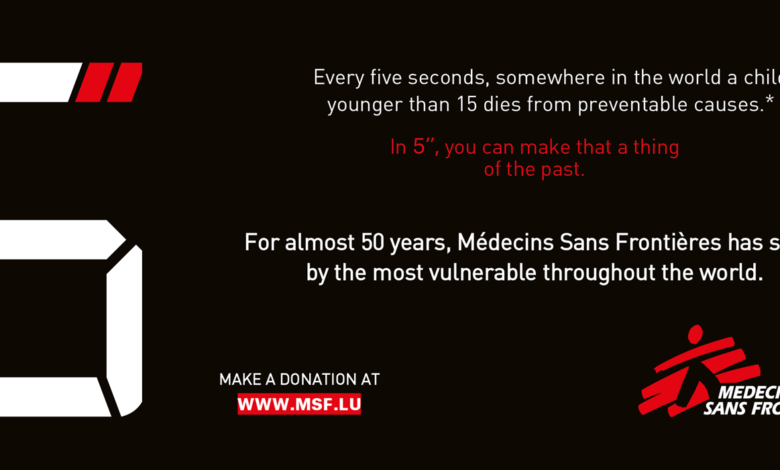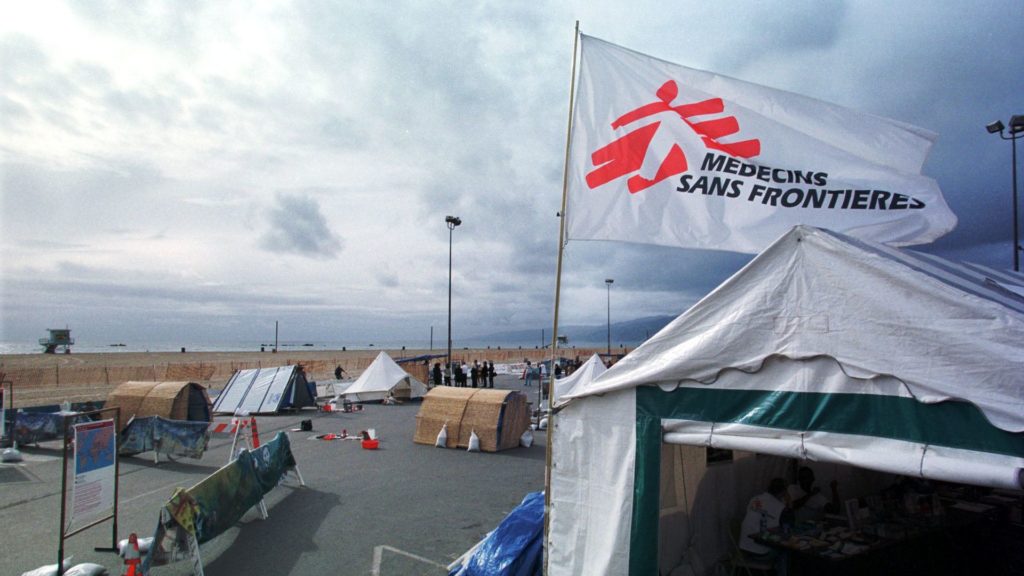
Médecins Sans Frontìères (MSF), translated in English as Doctors Without Borders, an International NGO founded in 1971, is celebrating its 50th year anniversary of providing mainly medical assistance to people affected by conflict, epidemics, or natural disasters. It also renders help to those excluded or unable to access healthcare.
How it began
MSF, which evolved from a group of French doctors who sought to help communities anywhere in the world lacking resources or are difficult to access, grew into a globally recognised humanitarian organisation and won a Nobel Peace Prize in 1999.
“From a dream, we created an epic story,” Xavier Emmnanuelli, 83, a co-founder of MSF, told AFP.
MSF began as a result of the 1968 Biafra war between secessionists in Southeastern Nigeria and the government. Civilians were being killed and denied food assistance by authorities.
Arriving in Nigeria, the doctors witnessed this and decided to expose the realities of the Biafra conflict through the media and questioned the International Committee of the Red Cross’s (ICRC) policy of silence. This move gave rise to the current concept of humanitarian aid.

MSF’s operations
For over 50 years, the organisation has had about 100 operations; they have conducted 10.4 million outpatient consultations, treated 2.6 million cases of malaria, and assisted in 329,900 births in 72 countries.
MSF has eased the sufferings of people in crisis situations mostly in West and Central African countries where they respond to different diseases, provide shelter, clean water, toilets and basic amenities.
Despite the challenges, MSF has always assisted in providing humanitarian aid to neglected victims of violence and natural disaster.
In Burkina Faso, host to more than 100,000 internally displaced people who have fled recurring violence in the northern region of the country, MSF has sent mobile teams offering healthcare to displaced people in the villages of Sirfou, Todiame, Rounga and Ouindigui in January, 2021 where access to healthcare and other basic services are limited.
So, with the continuous violence which has engulfed one million displaced people from their homes, the MSF team has set up medical projects in towns and have treated more than 20 surgical patients.
“As a medical organisation focusing on emergency response, we try to adapt to the volatile situation and provide the most comprehensive and timely response wherever it is needed.” Dr Youssouf Dembéle, MSF Head of Mission, said.
More programmes
In the Democratic Republic of Congo (DRC), MSF runs some of the largest programmes.
In 2019, it worked in 21 out of the country’s 26 provinces and responded to one of the biggest outbreaks of measles in decades.
Cholera was also an endemic disease in Sake town and one of MSF’s first concerns was to provide safe drinking water after the volcanic eruption in East DRC. In the first four days of work in Sake, MSF distributed 243,000 litres of water to local and displaced people. The organisation also built latrines and increased the number of chlorine distribution points to promote hygiene measures that prevent the spread of waterborne diseases.
“MSF medical teams are also reinforcing cholera surveillance and monitoring systems in four health centres in the city, where we are already supporting cholera-related activities in collaboration with the Ministry of Health,” Magali Roudaut, MSF Head of Mission in DRC, said.
More than 90 MSF health promotion staff are also supporting the emergency intervention in Sake, identifying sick people and directing them to the health centre, as well as providing information about hygiene, COVID-19, and cholera.
In Mali, MSF is currently working to assist the most vulnerable people. They are responding to the growing crisis in the central region, providing healthcare to nomadic communities in the north and caring for cancer patients in its capital, Bamako. MSF also supports nutrition and paediatric services in the southern Koutiala district.
The battle against the COVID-19 virus is being fought beyond hospitals in Mali. MSF are supporting the Ministry of Health team who go to Bamako neighbourhoods to inform people about what they should do to protect themselves from the virus so as to avoid spread. MSF has set up water points around 30 regions so far to facilitate hand washing in the most crowded places and plan to extend their initiatives.
So far, it has supported the Hospital du Mali (HdM) since April 2020 and external activities in three communities of Bamako with the help of the Ministry of Health, to combat the virus after the first wave.
MSF has also done 13,374 polymerase chain reaction (PCR) tests, 12,444 prevention kits have been distributed to the people with the most risk, and 109,244 people reached due to awareness activities.
In Nigeria, MSF has treated 22,648 children in need of emergency care at hospitals including 11,106 admissions in Zamfara and Borno in 2020 due to violence.
Also, 10,356 children were treated for malaria, 268 for measles between January and June 2021. MSF team has treated 10,717 patients including 6,090 who were admitted.
The message
MSF is keen on spreading their message among communities that children should be brought immediately to hospital as soon as they fall sick with malaria, its medical coordinator, Jacob Maikere, stressed.
In 2021, MSF responded to 100 girls and women who suffered from sexual violence. It also runs a 97-bed hospital in Pulka, Borno State, Northeast Nigeria, which offers free general and specialist healthcare to all residents, including the displaced.
In Cameroon, the MSF team responded to the COVID-19 pandemic in the country, providing training for hospital staff in different parts of the country. They also set up the only free 24/7 ambulance service and supported community health volunteers to reach people in remote areas and those struggling to access healthcare facilities until when Cameroonian authorities suspended MSF’s services in the North-west region, seven months ago.
MSF has not only responded to emergencies in African countries, they are also present in various regions responding to the needs of displaced people in Asia, the pacific, Middle-East, Europe and America.
Challenges
Since MSF’s establishment, its team has witnessed violence, death, abduction, atrocities, and neglect in the course of their work.
In DRC’s North Kivu, three MSF staff were abducted in 2013 and remain missing. After many threats imposed on the humanitarian aid workers, MSF stopped work by Dec. 2020.
In 2020, MSF lost one of their community health workers who was supported by the organisation whose killing was notified through an official statement by separatists in South-West Cameroon.
Also, in 2020, five teams were abducted and killed in Borno State, Nigeria.
“This is not the first time we have seen the deliberate targeting and execution of aid workers in Borno State, these murders come on top of similar atrocities in 2019, in which 12 aid workers were killed. MSF condemns in the strongest possible terms all violence against humanitarian aid workers,” Dr Christou, MSF International President,” said.
Last Month, MSF mourned the death of three colleagues who were working in Tigray region, Ethiopia, which served as a devastating blow despite trying to provide assistance.
Coupled with the fact that MSF is not dependent on government finances, there have been reports of blockage in some parts of the country by government officials.
There have also been records of mass looting and destruction of hospitals and medical centers built by MSF. Despite the appeal, armed persons still destroy equipment used for humanitarian assistance.
Also, with different diseases such as COVID-19, malaria, cholera and others, protecting health workers and those exposed to these affected areas has proven a major challenge to prevent.
Support Our Journalism
There are millions of ordinary people affected by conflict in Africa whose stories are missing in the mainstream media. HumAngle is determined to tell those challenging and under-reported stories, hoping that the people impacted by these conflicts will find the safety and security they deserve.
To ensure that we continue to provide public service coverage, we have a small favour to ask you. We want you to be part of our journalistic endeavour by contributing a token to us.
Your donation will further promote a robust, free, and independent media.
Donate HereStay Closer To The Stories That Matter




